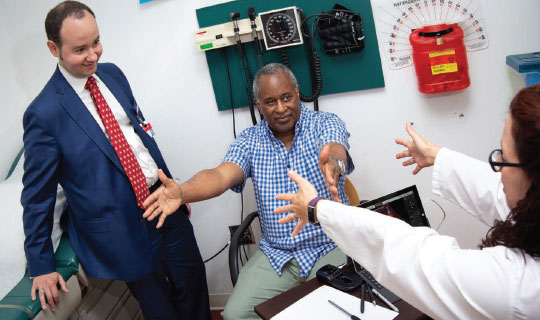“I have no problem with my writing or with buttons, and I can cook and wash dishes again. When I put my hand out, it doesn’t shake like it used to.”

Deep brain stimulation is just one of the advanced treatments that neurosurgeons and neurologists at Newark Beth Israel Medical Center can offer.
Geoffrey Atkins, 70, of Newark, spent decades running a successful Wall Street consulting business. Over time, he and his family had noticed that he had begun to develop minor shaking in his hands. The shaking got increasingly worse beginning in 2017, and he quickly found himself semi-retired. “I could no longer take notes during meetings. "I couldn’t type on a laptop; I couldn’t even trust myself to take a dinner plate to my granddaughters,” he says. “There were so many things I took for granted that I could no longer do.” The diagnosis.. essential tremor, a nervous system disorder that causes involuntary shaking. Medicine is an effective treatment for many, but it only made Geoffrey feel tired and sluggish.
Geoffrey’s research into his options led him to the Rutgers Neurological Institute of New Jersey at Newark Beth Israel Medical Center (NBI). He learned that neurosurgeons and neurologists there had access to the newest technology for “deep brain stimulation” (DBS) from medical device maker Boston Scientific. Geoffrey agreed to be one of the first two patients at NBI and in the entire state to reap the benefits of this specific technology. “Given my quality of life then and what the specialists told me, I knew this solution could help,” Geoffrey says.
Electrical answers
As the name suggests, deep brain stimulation involves sending mild electrical impulses to specific areas deep inside a person’s brain, interrupting electrical signals that cause tremors and involuntary movement. DBS is also effective for people with Parkinson’s disease (which, though it has similar symptoms, is a condition unrelated to essential tremor). “DBS is a tried-and-true treatment that has been FDA-approved since 1997 and that modern advances have made even better,” says Erin Feinstein, DO., a neurologist and expert in movement disorders at NBI.
When a patient is considered for surgery, a neurologist who specializes in movement disorders does an assessment to ensure proper diagnosis. For the surgery, a neurosurgeon and neurologist together use sophisticated equipment to pinpoint the location for stimulation. Guided by a computerized map of the brain, a neurosurgeon implants wires, or “leads,” to the brain through a small opening in the skull. The leads are connected to a pacemaker-like “controller” implanted under the skin of the chest.
“When medicines no longer help in reducing symptoms of Parkinson’s or essential tremor, or when side effects of medicines are extreme, DBS surgery is an exciting option,” says neurosurgeon Antonios Mammis, MD, Director of the Center for Functional Neurosurgery Neuromodulation at the Neurological Institute of New Jersey, Rutgers New Jersey Medical School. “With the addition of the Boston Scientific equipment, we can offer DBS to patients using any of three different types of systems. We’re the only center in the state with access to all three technologies, so we can give patients every opportunity to improve their lives.” Many patients and families do not know about DBS, he says. “We’re excited to let more people know it exists, right here in New Jersey.”
Precision control
Dr. Feinstein, who has been performing DBS for more than fi ve years, is impressed with the precision made possible by the new system. “It gives me better control over both the location of the stimulation and the strength of the impulses,” she says. “Patients are awake during the two three-hour surgery, so they can tell us immediately when we have the right
location and strength.” “As Dr. Feinstein did the programming, my ability to control my hand motions changed dramatically while she adjusted the electrodes,” Geoffrey says of the June 2019 procedure.over a period of months post-surgery, Dr. Feinstein adjusts the programmer during office visits. “I’ve seen major improvements,”
Geoffrey says. “I have no problem with my writing or with buttons, and I can cook and wash dishes again. When I put my hand out, it doesn’t shake like it used to.” He looks forward to returning to regular gym workouts, and maybe returning to work full-time. “I’m not sure about that, though,” he says with a laugh. “I’d like to spend more time with my children and grandchildren.”
How surgeons hone their skills
For golf and many other sports, professional athletes review videos of their performance to break down their movements and study ways they can improve. Surgeons at Newark Beth Israel Medical Center (NBI) are doing something similar. They’ve enlisted a team of experts from all over the world to review videos of their procedures. The program is called C-SATS—short for “crowd-sourced assessment of technical skills.” Using a secure online platform, and taking care to remove any personally identifiable details, NBI surgeons send videos of their robot-assisted and laparoscopic operations to C-SATS.
A team of experts reviews the video frame-by-frame and provides feedback. “The feedback might include comments about the surgeon’s control of the instruments, guidance for using both hands more effectively or ways to improve the speed and efficiency of the operation,” says Adam Kopelan, MD, Chair of the Department of Surgery and Director of Surgical Services at NBI, and a member of Barnabas Health Medical Group. “It’s highly detailed information that our surgeons welcome because it helps us improve care for our patients.” Since late last year, more than two dozen members of NBI’s medical staff have participated in the program. With the success of NBI’s pilot study, C-SATS will be offered to other surgeons in the RWJBarnabas Health system, he says. “In a year, I think all teaching hospitals will be using this tool.”
To learn more about cutting-edge treatments at Newark Beth Israel Medical Center call 888.724.7123 or visit www.rwjbh.org/newarkbeth.